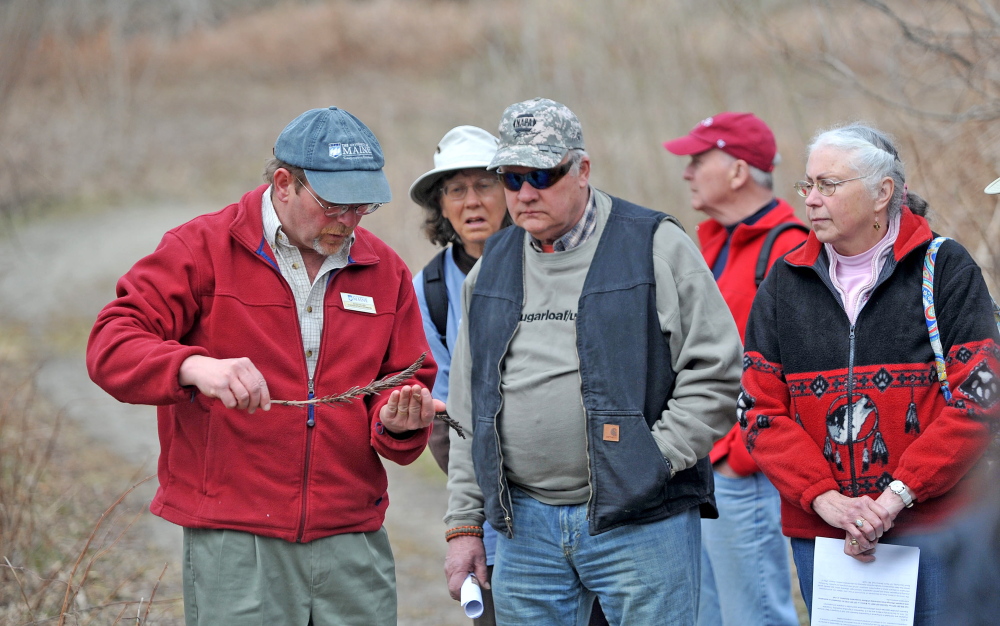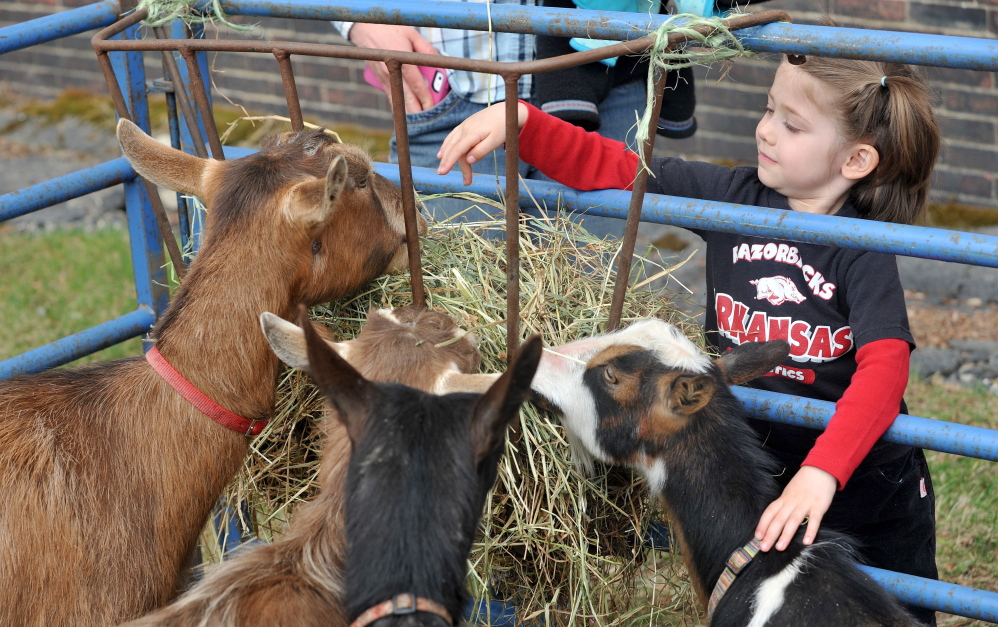FARMINGTON — If you go out in the woods to harvest fiddlehead ferns, be sure to use sustainable practices, an expert said Saturday at the Fiddlehead Festival and Local Food Day in Farmington.
Though it was too early for harvesting the ferns, David Fuller, who researches fiddleheads with the University of Maine Cooperative Extension, took a group of 20 attendees on a walk in the woods to show how unchecked foraging could wipe the fern out from a harvesting area.
Sustainable practices, he said, call for harvesting no more than half of the fiddleheads in an area and not going back for a second harvest that year, but foragers have been exceeding the limits of that area of the woods he showed them for years. He said the other half of the ferns is needed to produce spores and reproduce.
The ostrich fern’s coiled fronds, or fiddleheads, are harvested from the banks of rivers, streams and brooks in late April, May and early June in Maine. The early spring delicacy celebrated by Saturday’s festival has been growing in popularity, and Fuller said that overharvesting has become more of a problem in easily accessible areas.
“Fortunately they’re not as popular as the elver, or they’d all be wiped out,” he said in reference to the multi-million-dollar baby eel industry that has been the subject of debate over harvest regulation.
He said researchers don’t want to resort to regulation to keep fiddleheads from dwindling and are, for now, trying to promote sustainable practices through education. He said the extension office has had a good response to its education programs such as Saturday’s talk and an online fiddlehead fact sheet from his program has been downloaded 40,000 times.
The group of attendees went with Fuller on a walk behind McDonald’s, adjacent to Front Street, where Fuller said about 30 people harvest fiddleheads every year.
A bill last year proposed requiring written permission of landowners in order to harvest fiddleheads. The bill was eventually defeated, but Fuller said more regulation could be introduced if foragers don’t use common courtesy and ask landowners for permission to search for the ferns on their land. Foragers are advised to ask the town office for information on who owns the land they wish to forage on and get prior approval to harvest the ferns.
Fuller said the state’s fiddleheads are not in crisis as a whole, but it is important to take care of the ferns the state has now before it gets to that point. Festival attendees were told Saturday that the woods they visited across from Front Street and other similar areas that are easy to access are in danger of having their fiddleheads wiped out.
“I predict in about 10 years that here there really won’t be fiddleheads left,” he said, looking around the woods.
The ferns are valued far beyond Maine, he said, and on the West Coast can cost as much as $15 per pound, whereas in Maine they sell for as low as $2 per pound.
The ferns, he said, need to be properly washed and cooked to prevent food poisoning, such as an outbreak in 1994 that the Centers for Disease Control linked to fiddleheads. He said that in low lying areas, rivers can overflow on fiddlehead grounds and then recede, leaving behind contaminants from upstream.
“We’ve been trying to teach people not to rinse them off in the river either,” he said. “If you wouldn’t wash off your salad in the river, you shouldn’t wash off your fiddleheads in the river either.”
Fiddleheads should be cooked at a steady boil for 13 minutes or steamed for 10 to 12 minutes, he said, because there are no recorded cases of food poisoning for fiddleheads cooked that long. He said his office’s latest research project is to try to determine scientifically if the minimum safe cooking time could be lower than that.
When harvesting the fiddleheads, he said the stalk should not be cut with a knife but snapped by hand. The harvest in the Farmington area should start in a week to 10 days.
Rene Dechaine said he and his father, Roland, came to the talk to learn about foraging for fiddleheads themselves by Roland Dechaine’s camp in Smithfield instead of just getting their fiddleheads from neighbors.
Rene Dechaine, who was visiting from Maryland, said he was surprised to learn that fiddleheads can be found as far south as Virginia and feels that he could now identify the ferns on his own.
“I’m a home cook, so I was interested in learning about fiddleheads as a food and knowing the difference between the ostrich ferns and another fern that might be known to drop a cow dead,” he said.
Kaitlin Schroeder — 861-9252kschroeder@centralmaine.com
Send questions/comments to the editors.






Success. Please wait for the page to reload. If the page does not reload within 5 seconds, please refresh the page.
Enter your email and password to access comments.
Hi, to comment on stories you must . This profile is in addition to your subscription and website login.
Already have a commenting profile? .
Invalid username/password.
Please check your email to confirm and complete your registration.
Only subscribers are eligible to post comments. Please subscribe or login first for digital access. Here’s why.
Use the form below to reset your password. When you've submitted your account email, we will send an email with a reset code.